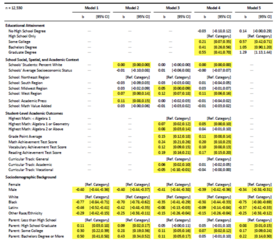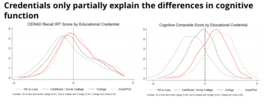Below are upcoming research presentations using EdSHARe survey data from High School & Beyond and/or the National Longitudinal Study of the High School Class of 1972. EdSHARe principal investigators, postdoctoral scholars, graduate students and staff, and other researchers with access to the HS&B and/or NLS-72 data regularly present their findings at conferences and other academic gatherings. The listings below contain a brief overview of the topic and information on where and how to view the presentation.
Presentations
The Association Between Schooling Experiences and Early Adult Cardiovascular Mortality
Cardiovascular mortality is one of the most common and preventable causes of death in the United States. CVD mortality is also strongly patterned by social determinants of health. Among these social determinants, education is the most malleable, but how the…
Education and Midlife Cognitive Functioning: Evidence from the High School and Beyond Cohort
Educational gradients in midlife cognitive functioning are widely recognized ─ but education is typically measured only as degree attainment. What do educational gradients in midlife cognition look like using a richer conceptualization of “education?”
Midlife Periodontal Disease and Cognitive Functioning: Evidence from the High School and Beyond Cohort
Periodontal disease is a prevalent, preventable, and highly treatable oral infection that is (1) stratified by sociodemographic, educational, and spatial factors and (2) is believed to impact cognitive impairment and ADRD risk. There is very little information from community-based, population-representative, longitudinal studies…
Beyond Credentials: Understanding Educational Gradients in Cognitive Function at Midlife
Much of the research surrounding educational gradients focuses on educational attainment. This characterization is limited because there is often variability in cognitive function among those with the same level of educational attainment, as well as across different levels. This research involves educational opportunities and …
Education and Midlife Cognitive Functioning: Evidence from the High School and Beyond Cohort
Educational gradients in midlife cognitive functioning are widely recognized. This research seeks to answer the specifics: what is it about education that contributes to cognitive inequalities? The attributes of adolescents’ schools shape their cognitive functioning at midlife‒mainly because they shape students’ test scores, grades, and degree…
High School and Beyond: An Education Cohort Study Becomes a Data Resource for Studying Aging, Health, Mortality, and Cognitive Functioning
High School and Beyond (HSB) began in 1980 to study how education shapes adult outcomes, and includes a nationally representative sample of 58,270 students randomly selected US public and private high schools. Data on students’ educational experiences, cognitive and non-cognitive skills, peers, educational and occupational plans, health…
Secondary School Quality and Midlife Health: Evidence from High School and Beyond
Much of the research on the association between education and later-life health considers the quantity of schooling that people complete without taking into account differences in school quality. However, people with the same quantity of completed schooling are highly diverse with respect to the quality of schooling they experienced.…
Understanding the Educational Gradient in Cognitive Function at Midlife
A substantial body of research points to the persistence of the shape of and variation in educational gradients in cognitive function across the life course, from early adulthood through old age. Fewer studies have considered the roles of educational opportunities and achievements early in the…
Do Educational Experiences Contribute to Black-White Differences in CVD-Related Mortality?
Though racial and educational disparities in CVD-related mortality are well-documented, prior research reveals counterintuitive findings regarding racial differences in the protective nature of education. Drawing insights from fundamental cause theory and the Black diminishing returns hypothesis, we investigate the educational sources of…
The Persistence of Black-White Mental Health Paradox in Later Adulthood: Evidence from the High School and Beyond
Drawing data from the High School and Beyond (1980-2021), the current study investigates whether the black-white mental paradox persists among older adults and how early life psychosocial resources and SES factors contribute to it. The preliminary results show that black Americans report lower levels of psychological distress than whites…









